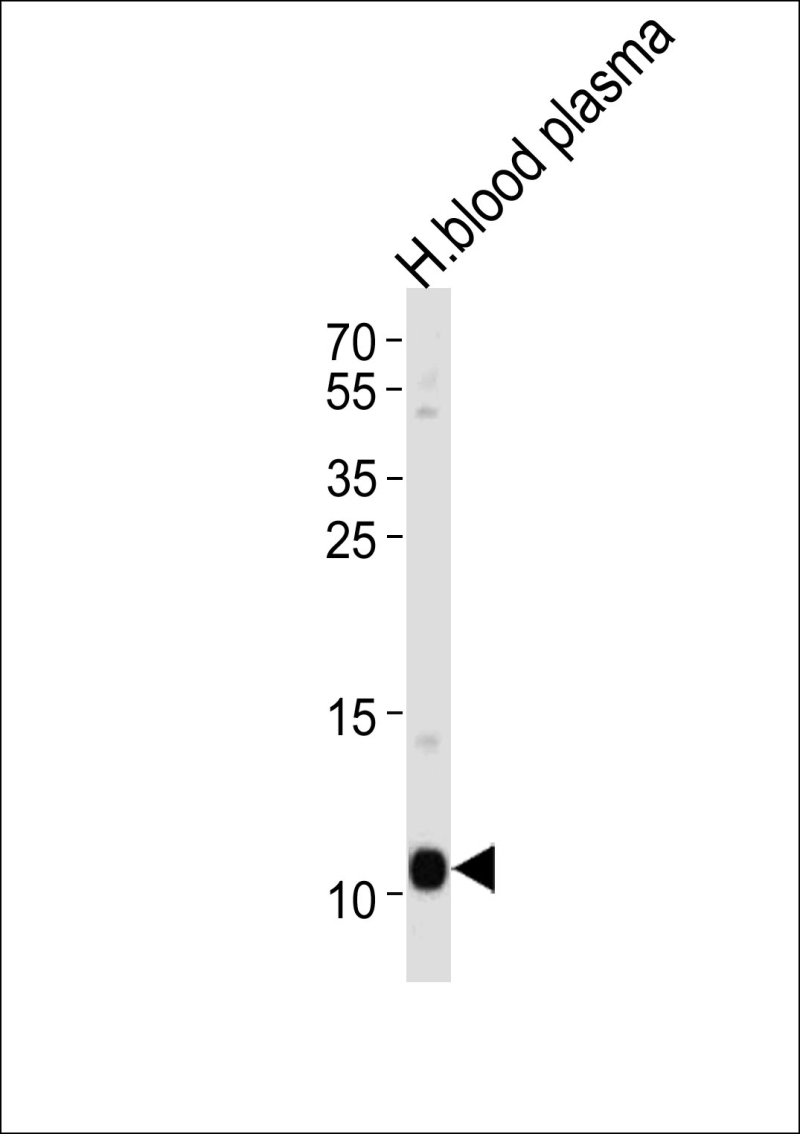
| WB | 1/1000 | Human,Mouse,Rat |
| IF | 咨询技术 | Human,Mouse,Rat |
| IHC | 咨询技术 | Human,Mouse,Rat |
| ICC | 技术咨询 | Human,Mouse,Rat |
| FCM | 咨询技术 | Human,Mouse,Rat |
| Elisa | 咨询技术 | Human,Mouse,Rat |
| Aliases | Apolipoprotein A-II, Apo-AII, ApoA-II, Apolipoprotein A2, Proapolipoprotein A-II, ProapoA-II, Truncated apolipoprotein A-II, Apolipoprotein A-II(1-76), APOA2 |
| Entrez GeneID | 336 |
| WB Predicted band size | 11.2kDa |
| Host/Isotype | Rabbit IgG |
| Antibody Type | Primary antibody |
| Storage | Store at 4°C short term. Aliquot and store at -20°C long term. Avoid freeze/thaw cycles. |
| Species Reactivity | Human, Mouse, Rat |
| Immunogen | This APOA2 antibody is generated from rabbits immunized with a KLH conjugated synthetic peptide between 23-56 amino acids from the Central region of human APOA2. |
| Formulation | Purified antibody in PBS with 0.05% sodium azide. |
+ +
以下是关于APOA2抗体的模拟参考文献示例(内容为假设性概括,仅供参考):
1. **文献名称**:*Autoantibodies against APOA2 in Type 2 Diabetes: Association with Insulin Resistance*
**作者**:Smith J, et al.
**摘要**:该研究检测了2型糖尿病患者血清中的APOA2自身抗体水平,发现其与胰岛素抵抗程度呈正相关,提示APOA2抗体可能参与代谢紊乱的病理过程。
2. **文献名称**:*Development of an ELISA for APOA2-Specific Antibodies in Cardiovascular Risk Assessment*
**作者**:Zhang L, et al.
**摘要**:研究者建立了一种高灵敏度的ELISA方法,用于定量检测人血清中的APOA2抗体,并发现其水平与动脉粥样硬化斑块稳定性相关,可作为心血管疾病风险的潜在标志物。
3. **文献名称**:*Pro-inflammatory Role of APOA2 Antibodies in Murine Atherosclerosis Models*
**作者**:Lee K, et al.
**摘要**:通过动物实验证明,APOA2抗体会增强巨噬细胞炎症反应,加速动脉粥样硬化进展,提示其在慢性炎症中的促病机制。
4. **文献名称**:*APOA2 as an Autoantigen in Autoimmune Hepatitis: Clinical Implications*
**作者**:Johnson R, et al.
**摘要**:首次报道APOA2抗体在自身免疫性肝炎患者中的异常表达,并探讨其与肝损伤标志物的相关性,为疾病诊断提供了新方向。
**注意**:以上为模拟文献,实际引用需通过学术数据库(如PubMed、Web of Science)检索真实发表的研究。
**Background of APOA2 Antibody**
Apolipoprotein A-II (APOA2) is a key protein component of high-density lipoprotein (HDL), playing a role in lipid metabolism and cardiovascular health. Encoded by the *APOA2* gene, it is the second most abundant apolipoprotein in HDL and exists primarily as a homodimer. APOA2 stabilizes HDL structure, modulates enzyme activity (e.g., hepatic lipase), and influences cholesterol transport.
APOA2 antibodies are essential tools for studying its expression, distribution, and function in metabolic and cardiovascular diseases. Research links APOA2 levels to conditions like atherosclerosis, obesity, and type 2 diabetes, though findings are sometimes contradictory—e.g., low APOA2 may correlate with atherosclerosis risk, while elevated levels are associated with insulin resistance.
These antibodies, including monoclonal and polyclonal variants, enable detection of APOA2 in immunoassays (ELISA, Western blot), immunohistochemistry, and clinical diagnostics. They also help investigate genetic variants (e.g., -265T>C polymorphism) affecting APOA2 expression and disease susceptibility.
Despite progress, APOA2's precise mechanisms remain unclear, necessitating further research. APOA2 antibodies thus remain critical for unraveling its dual roles in lipid homeostasis and metabolic pathologies.
×